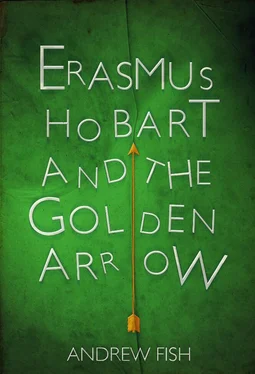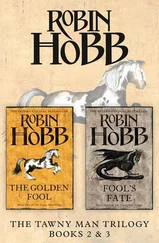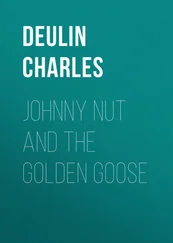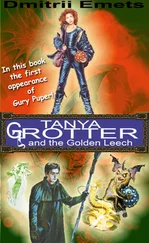Erasmus halted several feet away. The man’s face wasn’t as red as before and there was a new scar across his left cheek, but it was quite clearly the same man who had just pursued him to his time machine. It was somewhat disconcerting, especially when the man now stood between him and his only means of escape. Perhaps it would be all right – it must have been a couple of years in this man’s time and he may well have forgotten the previous encounter.
Erasmus backed away slightly to what he hoped was a safe distance, watching as the armoured man examined the privy. He seemed very cautious about what, to his eyes, must have seemed like a simple, wooden box and he prodded at it with his sword tentatively. The machine, naturally, did nothing and Gisburne was emboldened by this small victory. Passing his sword to his left hand, he tried to pull on the door. It didn’t open and he struck out at the machine with his fist in exasperation. Erasmus, unnerved by the sudden, violent action, took a further step backwards and his foot came into contact with a metal bucket, which resounded like a bell. Gisburne spun on his heel and his eyes bulged as he recognised the occupant of the mysterious privy.
‘You,’ he yelled, raising his sword and moving forward.
Erasmus tried to back away further, but he was now right up against the wall. In desperation, he took Atkinson’s bow from his shoulder and tried to wield it like a staff. Gisburne swung at the weapon with his sword and the bow was smashed in a single blow. Pausing only to reflect that Atkinson wouldn’t be pleased, Erasmus turned and fled around the bailey, accidentally charging through a chicken coop and sending squawking poultry flying in all directions.
Gisburne pursued him, kicking one of the chickens that crossed his path. At a steady run, Erasmus soon found himself passing the gatehouse and he realised there was no way he could get far enough ahead of Gisburne that he could unlock and enter his time machine before he was caught.
He looked around him, desperate for a direction in which he could escape. He briefly considered running out of the gate, but there could be an entire army camped outside for all he knew. He ran on. Gisburne, not far behind him, called out as he passed the gatehouse and two guards hurried over to join him in the pursuit.
Twenty seconds later, Erasmus rounded the bailey and found himself back at the privy, with Gisburne and the two guards hot on his heels. Unable to think of any alternative, he began another lap. Behind him, Gisburne instructed one of the guards to go around the other way and head him off.
Erasmus ran, the repetition of the scenery reminding him of the tiresome distance races on sports day when the boys just ran around a short circuit until they either finished the race or lost count of how many laps they had done. He tried to regulate his breathing, to pace himself and stop treating the run as a sprint, but he still found the exertion painful.
There had to be a way out. As he passed the gatehouse again, he glanced up and saw a guard running towards him in the other direction. He looked left, but there was another guard standing in the archway with sword in hand. He looked right – there was yet another wooden building. He ran in.
The first thought that struck Erasmus as he blinked in the darkened interior of the building was how inefficient the chimneys were: despite the sheer volume of smoke pouring out of the roof, the inside was still filled with an acrid vapour, most of which seemed to be pouring from a forge by the wall. The armourer, a solid-looking man whose bare arms appeared to be one hundred per cent muscle, looked up briefly from working a piece of metal on his anvil then, apparently uninterested, went back to his hammering. Erasmus looked around him for a place to hide – there didn’t seem to be one. Then his eyes fell on a rack of swords and he dived for the nearest weapon.
The armourer looked up. ‘Hey,’ he said. ‘What you doing with that?’
‘I’ll bring it back,’ said Erasmus.
‘You can’t take them, they’re not finished.’
Erasmus wanted to explain, but Gisburne chose that moment to run in and Erasmus, ignoring the armourer’s protests, lifted the sword from the rack and swung it in a wide arc. As he did so, the blade, not yet secured into the hilt, detached and hurled across the room like a steel missile. Gisburne flinched as the blade passed startlingly close to his cheek and embedded itself in the wall next to him, then he began to approach Erasmus slowly, keeping his sword arm extended.
Erasmus looked disbelievingly at the hilt in his hand, then threw it at Gisburne, who deflected it with his sword and kept coming. Erasmus grasped another sword from the rack. This time the hilt came off in his hand. He dropped the useless weapon to the floor and stepped back, groping his way along the wooden table to his right until his hands closed on something metal. Glancing down, he found he had discovered a small pile of horseshoes. He picked one up and threw it at the knight. Taken by surprise, Gisburne fended off the missile with his sword, the resounding clang echoing around the room, but he was forced to step back. The armourer, disturbed by the sound, looked over to where Erasmus stood, already holding another horseshoe. Annoyed with the disrespect being shown for his work, he shook his head before returning to his hammering with increased vigour.
Erasmus and Gisburne faced each other across the smoky room. Gisburne held his sword in both hands, like an upraised cricket-bat, and Erasmus hefted his horseshoe, turning it in his hands and trying to get a feel for its balance. Neither man spoke, each waiting to see what the other would do.
It was Erasmus who acted first: he threw the horseshoe to Gisburne’s right in an attempt to put him off-balance. Gisburne dealt the horseshoe a blow and it crashed into the forge in a shower of sparks, earning him a scowl from the armourer.
Erasmus’ second shot went wide of Gisburne’s left, bouncing off one of the posts which held up the roof, and Gisburne was forced to parry the ricochet.
Now Erasmus tried two shots in rapid succession, but Gisburne had expected this and deflected both in a quick one-two action. Erasmus glanced down at the bench – he had two horseshoes left. Cautiously, he picked both up, passing one to his left hand. Gisburne, glancing quickly at Erasmus’ hands, put his left foot back to steady himself and held his sword in front of him. Erasmus turned the two shoes in his hands; they were quite heavy and his arms were beginning to tire. He banged one shoe against the bench, causing a vibration to resonate along it and Gisburne, distracted by the sound of vibrating nails on his left hand side, took his eyes off Erasmus. Quickly, Erasmus hurled both shoes at the same time. The first came so close to hitting the knight that he was forced to duck, there being no time to parry; unfortunately, Erasmus was less capable with his left hand and the second shoe went hurtling across the room and nearly hit the armourer. Scowling at the teacher, the muscleman put down his hammer and backed away to a corner of the room where he proceeded to wipe the sweat from his hands and view the proceedings with a combination of annoyance and interest.
Erasmus used the momentary confusion to his advantage and backed quickly around the room until he stood next to the forge. As Gisburne circled around him, the teacher picked up a pair of tongs, extracted a piece of white-hot metal from the coals and brandished it at the knight. Gisburne tried to parry, but, even at arm’s length, he could feel the heat of the metal. He took a step backwards.
‘Now come on,’ he said in what he hoped was a placating manner. ‘Put down the weapon and we’ll talk about this like civilised people.’
Читать дальше











